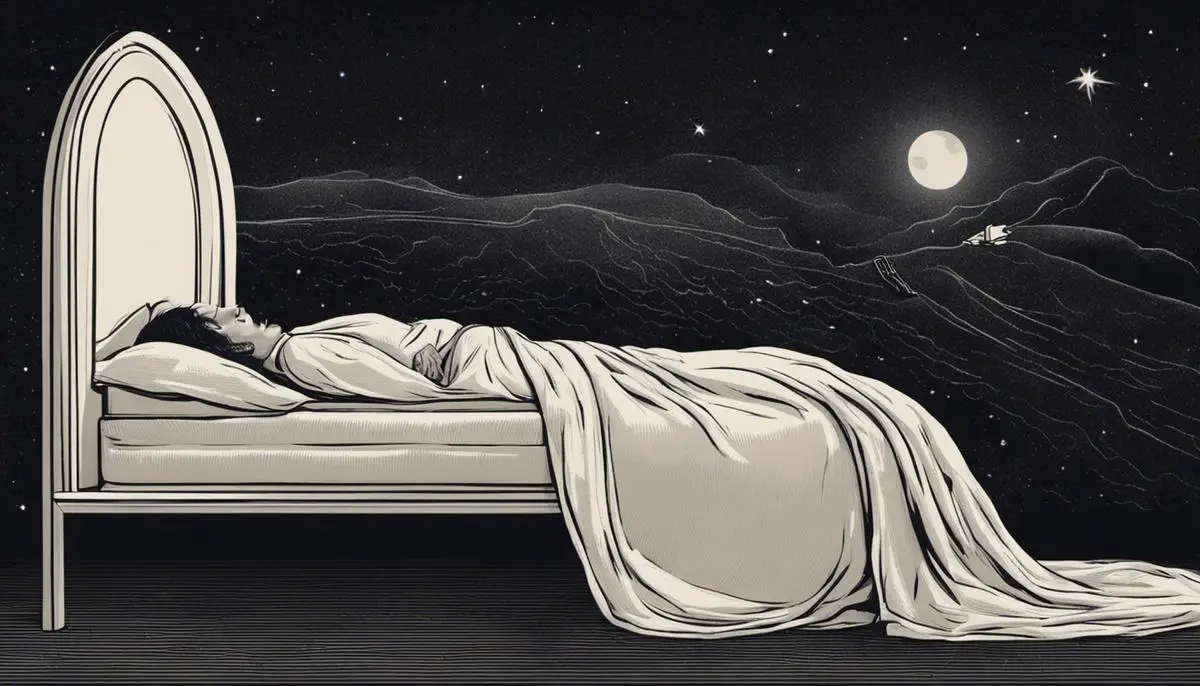The enigmatic world of dreams has been a subject of intrigue and investigation for centuries. Of particular note for many is the recurrent nightmare of losing teeth, a rather common, yet unsettling dream theme. In this examination, we journey into the subconscious, exploring diverse interpretations, connections with personal fears, and how such dreams are symbols of real-life events from various psychological, cultural, and esoteric perspectives. Digging deeper, we also explore how these anxieties are often manifested as losing teeth in dreams, scrutinizing theories and research on the subject. Furthermore, we examine how these dreams can reflect significant transitions or changes in a person’s waking life. An essential aspect of this exploration is not merely understanding these dreams but learning how to manage the fears and anxieties they embody. In this process, practical, evidence-based approaches to alleviate pre-sleep anxiety and various dream interpretation techniques will be presented.
Interpretations of Losing Teeth in Dreams
Psychoanalytic Perspective on Tooth Loss Dreams
Sigmund Freud, the father of psychoanalysis, interpreted the dream of losing teeth as a manifestation of castration or sexual repression anxiety. Freud believed that such dreams reflect concerns about our sexual encounters, attractiveness, and self-image. His interpretations, though controversial, triggered a wave of thought in the exploration of dream analysis.
Dreams as Reflections of Waking Life Fears
In contrast, Calvin S. Hall’s cognitive theory of dreams suggests that dreams often mirror our waking concerns. Losing teeth, a common dream, may symbolize anxieties about personal losses, signs of aging, or feelings of vulnerability and helplessness. People facing significant life changes or fearing the loss of control may have recurring dreams of teeth falling out.
Dreams and Fear of Death
Some interpretations connect dreams of teeth loss to subconscious fears about death and mortality. This notion is entrenched in some psychoanalytic approaches while also echoed in cultural and spiritual interpretations. As teeth can be a symbol of health and vitality, losing them in dreams can reflect our apprehensions about declining health and the inevitability of death.
Symbol of Change and Transition
Dream analysts often interpret teeth falling out as symbolic of transitions and metamorphosis. Losing a tooth can mirror a shift in your life — such as moving, changing jobs, or ending a relationship — which is why such dreams are frequent during periods of change. It could signal your subconscious grappling with accepting the changes and your anxiety of the unknown.
Cultural Perspectives on Tooth Loss Dreams
In Chinese culture, a dream about tooth loss is a bad omen suggesting that a family member might be in danger or facing health issues. Conversely, in Japanese folklore, such dreams can indicate that a person will live a long life. In certain African cultures, tooth loss dreams might symbolize the dreamer being lied to or deceived.
Dreams as Spiritual Communication
In some spiritualist perspectives, dreams of losing teeth can be seen as messages from the spirit world. They can be interpreted as a call to look within, introspect, and reconnect with our authentic selves. These dreams might be a signal that we are on the wrong path and need to adjust our course.
Tooth Loss Dreams and Personal Growth
Carl Jung, a Swiss psychiatrist and psychoanalyst, proposed that dreams are a pathway to personal growth. In his view, losing teeth in a dream might symbolize birthing new perspectives or goals. Essentially, these dreams could be indicating a need for personal evolution, urging us to let go of outdated beliefs and grow.
Despite the varying interpretations, it’s vital to realize that the analysis of dreams is remarkably subjective and personalized. Each interpretation may have a powerful resonance for many people, dependent exclusively on their specific circumstances, belief systems, and life experiences. The interpretation of dreams can be elusive; several aspects have to be considered, but they can offer us fantastic insights into the workings of our subconscious mind, when we contemplate it with care.
Associations with Personal Fears
The Relationship Between Losing Teeth in Dreams and Personal Fears
Delving from the perspective of psychoanalysis, it’s suggested that various themes that appear in our dreams are, in fact, manifestations of our subconscious fears, anxieties, and wants. A common theme experienced by many people is a dream involving the loss of teeth. Such dreams hold substantial significance and often act as reflections of personal fears and anxieties we deal with in our waking lives.
Fear of Aging and Teeth Loss Dreams
The symbolism of teeth loss in dreams can be tied to personal fears and concerns over aging. As we grow older, the health of our teeth naturally deteriorates, and the fear of losing them serves as a metaphor for the loss of youth, vitality, and attractiveness. This fear often manifests itself through exacerbating dreams, portraying the individual losing their teeth. It’s essentially a subconscious expression of the fear of growing old and losing physical strength or beauty.
Fear of Image Degradation
In today’s looks-conscious society, image is everything. A dream about losing teeth can also be linked to a fear of image degradation. Teeth play a vital role in the formation of one’s physical appearance. Fears of not being attractive, experiencing embarrassment, or being socially awkward can manifest as teeth loss in dreams. A bad dental structure or loss of teeth is often associated with being unattractive. Hence, these dreams can be interpreted as a subconscious expression of an individual’s concern about their physical appearance or social image.
Concerns about Health
Our teeth are also symbolic of health and well-being. Therefore, dreams about teeth falling out can also represent fears about health. In this context, losing teeth in a dream can serve as a warning sign from our subconscious mind about health-related fears or concerns. People who are stressed about their health or those going through some illness often report having such dreams.
Psychological Interpretation
Psychoanalysts like Sigmund Freud and Carl Jung have interpreted dreams of teeth loss to stem from anxiety. Freud equated such dreams to stress and repression, often related to the individual’s sexual drive. On the other hand, Jung interpreted these dreams as a sign of a significant life transition, fear of change, or a feeling of personal loss.
Research Studies on Teeth Loss Dreams
Several research studies have focused on understanding the association between dreams of losing teeth and waking life fears. A common finding is that these dreams correlated strongly with personal insecurities, feeling powerless, and experiencing significant changes. Stressful events or transitions, such as a career change, relationship shifts, or concerns about body image, often precede these dreams. These studies reinforce the theory that dreams of losing teeth are significant indicators of personal fears and anxieties.
An Overview of Tooth Loss Dreams
In the realm of dream interpretation, dreams about losing teeth are frequent and often associated with a range of personal fears and anxieties manifesting from an individual’s waking life. These fears can significantly vary, including worries over physical appearance, fear of aging, concerns about health conditions, personal loss, feelings of powerlessness, and more. By gaining insights into these symbolic representations and associations, individuals can better understand their anxieties and navigate their way through them.

Teeth Loss in Dreams as Symbol of Life Events
Tooth Loss Dreams as Reflections of Real-Life Experiences
Dream symbolism, a potent aspect of psychoanalysis, has been thoroughly studied and interpreted for centuries. Among numerous dream symbols, the loss or deterioration of teeth appears frequently. This nocturnal phenomenon is often interpreted by psychologists and dream interpreters as a profound reflection of one’s real-life fears, anxieties, or experiences.
From Freud’s perspective in the psychoanalytic theory, dreams occur as manifestations of our subconscious or repressed thoughts and emotions, essentially offering a direct gateway into the inner workings of the mind.
Therefore, dreaming about losing teeth may serve as an expression of one’s anxieties related to alterations in personal appearance, the process of aging, or other life transformations. Given the central role teeth play in our daily lives—enabling communication and food consumption—a dream highlighting tooth loss can symbolize significant transitions, losses, or uncertainties in waking life.
Linking Teeth Loss Dreams to Life Transitions
Life transitions, for instance, job changes, relationship shifts, or significant personal alterations, can trigger such symbolic dreams. A dream of losing teeth could represent the fear of losing control, especially when embarking on a new phase of life like a fresh job or leaving an old relationship. This could express a person’s fears about the uncertain future or their inadequacy in managing the new project or relationship.
Tooth Dreams Reflect Relationship Concerns
Several case studies suggest that dreams of losing teeth may occur when a person is negotiating relationship changes. This could mean anything from the dissolution of friendships or romantic relationships, or the reconfiguration of power dynamics within existing relationships. The fear of loss in a relationship can manifest as teeth falling out in dream symbolism, reflecting the deep-seated fears of abandonment or emotional humiliation.
Dream Teeth and the Fear of Aging
Another interpretation suggests that losing teeth in dreams might reflect the fear of aging or perceived loss of attractiveness. In a society where physical appearance and youthfulness are valued, the loss of teeth in dreams could indicate a fear of becoming old or no longer being deemed attractive.
In essence, dreams about losing teeth are rich in symbolism and complexity. It’s crucial to consider what these dreams might signify, but one should bear in mind that the analysis of dreams is an extremely subjective matter. Consequently, when interpreting these dreams, personal experiences and emotions have to be factored in. It’s always worthwhile to remember that seeking professional help could aid in achieving a more precise interpretation, and help to tackle any existing anxieties or fears.

Managing Fears and Anxieties Manifested in Dreams
Deciphering Dreams of Teeth Loss
The art of interpreting dreams has been a part of human behavior for millennia, and among them, dreams about losing teeth are frequently reported. A lot of experts suggest that such dreams are reflective of our waking life anxieties. Frequently, these dreams get connected with sensations of insecurity, vulnerability, and unease about personal image. Fears of being rejected, facing changes, or losing grip on situations may indeed be the root causes for these disquieting dreams.
Interpreting Teeth Loss Dreams
Dream interpretations can vary based on personal experiences and unique situations. In the context of losing teeth, some experts might link these dreams to personal loss or regret. Others might consider it a symbol for the fear of aging or the fear of change. However, it is important to not rely solely on generalized interpretations, as dreams are a highly personal experience. Regular journaling your dreams can help you identify patterns and personal meanings to your dreams. Self-reflection can provide insights into the recurring themes and emotions that could be causing these dreams.
Stress Management Before Sleep
Reducing anxiety and stress before bed is a useful strategy to mitigate nightmares or anxiety-provoking dreams. Developing a regular sleep schedule, maintaining a sleep-friendly environment, and practicing relaxation techniques such as deep breathing, meditation, or progressive muscle relaxation are beneficial habits to adopt. Avoiding food, caffeine, and electronic devices close to bedtime can also help improve sleep quality.
Professional Psychological Help for Dream Anxiety
Despite your best efforts, if repeated nightmares or distressing dreams persist and begin to affect your daily functioning, it could be a sign of an underlying psychological issue. In such instances, consider seeking professional help. Psychologists and therapists can provide cognitive-behavioral therapy (CBT) to help manage these anxieties. This type of therapy focuses on changing negative thought patterns that can lead to anxiety and fear.
There are also treatments like Image Rehearsal Therapy (IRT), a cognitive-behavioral treatment for nightmares, which helps individuals to change their disturbing dreams into something less threatening.
The Role of Psychiatric Medications in Managing Dream Anxiety
Prescription medications should be a last resort and under the guidance of a psychiatrist. Certain drugs like Prazosin have been found effective in reducing nightmares caused by post-traumatic stress disorder (PTSD). However, medications should not be considered a first-line treatment, as lifestyle modification and cognitive-behavioral approaches have shown to be largely effective without side effects.
In Conclusion: Regularly Monitor Stress and Anxiety Levels
Remember that stress is a part of life, but recurrent high levels of anxiety and their manifestation in your dreams can be an indicator of much deeper issues. Self-monitoring of stress levels and understanding stress triggers can reduce the frequency of unpleasant dreams and improve overall mental health. With professional guidance, effective stress management techniques, and possibly medication, you can overcome fears and anxieties, transforming your dream world into a more peaceful and less distressing space.

Our exploration of something as arcane as losing teeth in dreams uncovers that they are more than unsettling visions in the night. They represent a complex intertwining of our subconscious fears, life changes, and personal insecurities. The way these dreams intertwine with our waking life fears adds another layer to this complexity, representing a tangible expression of our internal struggles. By understanding the psychological, cultural, and esoteric interpretations of losing teeth in dreams, we can better comprehend our fears, anxieties, and life transitions. Furthermore, by implementing stress management practices and tapping into dream interpretation, we can learn to alleviate anxiety, better interpret our dreams, and use this understanding for our personal growth and mental well-being.
